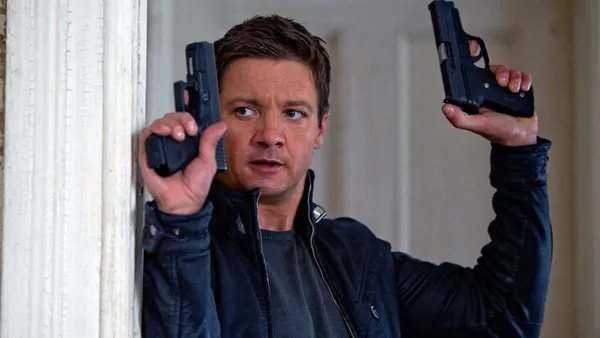Eye For Film >> Movies >> The Bourne Legacy (2012) Film Review
The Bourne Legacy
Reviewed by: Andrew Robertson

The first shot of Bourne Legacy is a pretty evident homage to the last shot of the Bourne Trilogy, and one is minded to say 'homage' more out of charity than clarity. Extreme Days closes this film as with the other three outings, and its composer Moby says it best: "then it fell apart".
If you haven't seen the Bourne Trilogy, you should watch it instead of this. If you have, then this fits into the cracks of some moments in the denoument of the trilogy's conclusion, The Bourne Ultimatum. That's a lot of endings to try to work around, but unlike Peter Jackson there's not a Silmarillion or scholarly footnotes to tap - instead we get an "Inspired By" credit for Ludlum's novels, though director Tony Gilroy and his brother Dan claim responsibility for the script.

In Jason Bourne we had a protagonist who had been a shadowy assassin, a right bad'un, but absolution came early and as tabula rasa he faces the world. Wrongs are done to him, and he revenges those wrongs - a flaming sword and scourge of the wicked, acquiring allies among the righteous. Jeremy Renner's "Aaron Cross" is not an innocent, he's got a cynical streak, a wry smile, a questioning air and a motivating McGuffin - a green pill and a blue pill, a sort of chemical leash. He's also been wronged, quite markedly so, but while some call technothrillers "science fiction with the President" Legacy manages to ignore a number of key genre precedents. The sin against Cross is far from original, Algernon and his flowers springing to mind, but it does seem as if Legacy is trying for a spiritual angle - where Jason had a, well, odyssey, Cross has one to bear.
Circumstances lead him to Rachel Weisz to help free him from the monkey on his back - a blank and battered dog-tag with those pills inside, not to mention the arrayed apparatus of a clandestine parallel government - no jurisprudence here, not even secret courts - no judge, no jury, all executioner. Hunted individually they collaborate, there's a measure of chemistry between them and a good job is made of breaking down their initially clinical relationship. Weisz manages surprise and outrage pretty well, panic too, and when she's in her element her Dr Shearing does what we'd expect the virological equivalent of James Bond's 'Q' to do. That said, she still basically serves as the green key to the green door in Cross' attempt to resolve his need for those magic pills.
Ed Norton's relatively anonymous apparatchik, credited as Colonel Eric Byer (Air Force Ret.) at one point describes the work of the unit as akin to "Sin Eaters" - doing the worst so other hands can stay clean. It's a tiny, revealing moment, almost wasted in a sunny alleyway occasionally rocked by explosions, a far more fascinating facet of characterisation and exposition than is achieved anywhere else. As events from the Trilogy threaten to expose other hidden projects it's with a messianic fervour that houses are cleaned - razed by fire, gun-fire, AGM-65 Hellfire, it's a more than metaphorical reaping as RQ-9A drones abound. First-born are culled, creators fall, and while there's talk of "infection" and cancer-metaphor the real tone is Millenarian, apocalyptic. There's something fascinating in that cult-like behaviour, that fear of revelation, but Legacy doesn't seem to be aware of the semantic shadow it's casting and so leaves that aspect of darkness unilluminated.
Instead we get some fighting, some explosions, a chase and a manhunt; it's not the slavish copying of the scriptorum, though the action sequences retain a touch of the obscur-o-vision and "shake until realistic" that pollutes modern action films. There is a well-staged conversation in a cupboard-cum-server-room, and a few well-worked montages in one of those 'mission control' suites too. There are some surprising bits of accuracy - at one point the assembled monitor-jockeys are told that if they can't make what's on their screen go on the big screen they should talk to the guy who can sort out what amounts to the permissions on their account. It's something that's instantly familiar to anyone who has worked with corporate (or government) IT, and it's all the more frustrating because it's a clever and observational aside in film whose main thrust is neither. While there's realism in a plan to just grab data until some of it's useful, even the business of authorisation codes and telephony, that old-fashioned intelligence gathering seems a stark contrast to the other business of the 'agency'.
The profusion of superspy projects is briefly mentioned, but the frankly shocking willingness of others to kill and kill and kill to keep those projects secret isn't. Indeed, one starts to question the need for genetically-enhanced assassins when it seems there's no shortage of civil servants willing to terminate others with extreme prejudice, and that's before we get to the neurochemical "kill-switches" that all the superspy superscience supports.
There are solid supporting turns. Scott Glenn, Albert Finney, David Strathairn and Joan Allen all reprise roles from the Trilogy. Stacey Keach is new to the Bourne-continuum but as with Finney and Brian Cox before him he slots right in. Though Allen's Pamela Landy instigates the plot, her potential exposure of OUTCOME is the reason these shadowy men have gone for the Albigensian option. Most of her early appearances are as photographs or as news footage. So too Matt Damon and others - there's a good five minutes or more lifted wholesale from The Bourne Ultimatum, and while they are good minutes it's surprising what's left out - even when they decide to "kill them all, God will know his own" the bad guys seem to avoid collateral damage quite deftly - there's none of the anguish inherent in a by-stander getting forcibly sedated and bundled away in an anonymous minivan, even the inevitable drone-strikes lack the civilian casualties one has come to expect.
Perhaps most surprising is how slight it feels - though the action covers the space of only a few days, in retrospect it doesn't feel as long as its two and a quarter hours. It manages to speed along even though there are several scenes where we are effectively watching people waiting to find something out, but that may simply be because there are several scenes where an event occurs to advance the plot but there's a long back and forth until it does. When the audience know that there's going to be something bad happening to a pair holed up in a cabin, with blunt foreshadowing in the form of an approaching propellor and earlier visions of drones, it still takes a good four or five shots of them literally going back and forth before they make a decision. One would think that they would demonstrate something approaching caution with a tad more alacrity, but as we wait for them to do take action what could be an opportunity for tension instead becomes annoyance - for all the alleged history at the sharp end it seems the betrayal takes them by surprise, and that stretches credulity further than the genetic enhancement.
It falls to Weisz to explain the process and some of the consequences - apparently two minor adjustments, one physical, one mental. There's the training, of course, the conditioning, but that was Bourne, an operating system upgrade to basic human hardware - this is apparently a new machine. In the vast corpus of speculative fiction that explores the shallow transhumanism of supersoldiery these are the usual two, but in the context of Captain America or Universal Soldier and so on it would have been nice to see selection for suave - James Bond has charm, panache, grace, and Legacy could have done with any of those. Renner can display it, should display it, and there'd be a more convincing and genuine terror in the notion of a rogue asset who can ask people nicely to do things and then they'll do it. Instead it's the usual mixture of bullets not working on guys who can kick really high and a little bit of MacGyvering.
When measured against other spy films Legacy falls short - it lacks the cynicism and also the idealism and sheer craftsmanship of Tinker Tailor Soldier Spy, it lacks the bombast of recent Bond outings, and as a strict actioner it pales in comparison to The Raid and for sheer gleeful nonsense The Expendables. One of the reasons that the thriller genre has upped its game of late was the Bourne Trilogy, and while other film-makers have learned lessons from it Legacy seems to have borrowed the trappings but not the intent. This film isn't without its merits - good performances from Renner, Weisz, and Norton, a few moments of cunning and tradecraft, a few frenetic setpieces - but its biggest problem is that it feels like a cynical exercise in marginalia, an attempt to bootstrap a franchise in a gap as thin as a shoelace, and in the process it manages to tie itself into knots.
Reviewed on: 15 Aug 2012



















